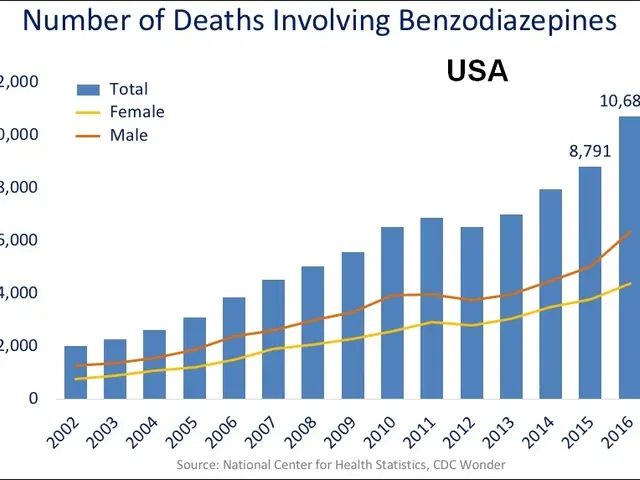Flatlining Japanese Life Expectancy in 2024
In 2024, the life expectancy of Japanese citizens continued to impress, with the average lifespan for newborns remaining almost unchanged from the previous year. According to data from the health ministry, the average life expectancy for Japanese citizens born in 2024 is 81.09 years for men and 87.13 years for women [1][2][4][5].
The health ministry's survey, which began in 1947, revealed that Japanese men's life expectancy ranked sixth globally in 2024, dropping one place from 2023. Japanese women maintained their top position, with South Korea following in second place [6][7]. Specifically, the share of Japanese women born in 2024 who are projected to live until 90 years is 50.2%, while the share for men is 25.8% [2].
The stability in life expectancy in 2024 can be attributed to several key factors. Firstly, there was a significant decrease in deaths from cardiovascular diseases and COVID-19, which had caused fluctuations in life expectancy in previous years [1][2]. Although deaths from senility and pneumonia saw a slight rise, these did not significantly impact overall life expectancy [2].
Japan's healthy lifestyle, advanced healthcare system, and effective preventive measures continued to support longevity, mitigating further declines caused by the pandemic [1][3]. The 2023 data showed these mortality improvements starting to balance out the prior negative effects of COVID-19, allowing life expectancy figures in 2024 to stabilize [1][2].
It's worth noting that the life expectancy rebounded in 2023 as the number of deaths from the disease dropped. However, the decline in life expectancy in 2021 and 2022 was due to the COVID-19 crisis [8][9].
The average life expectancy is a future average lifespan for children born in a particular year. Since the health ministry started the survey in 1947, the average life expectancy has generally been climbing, reflecting Japan's commitment to healthcare and lifestyle improvements. Japanese women's life expectancy remained in first place globally in 2024 [7].
In conclusion, the relatively unchanged life expectancy in 2024 reflects a recovery and adaptation after the pandemic's worst impact years, supported by healthcare and lifestyle factors unique to Japan.
References:
[1] Health Ministry of Japan (2024). Life Expectancy Survey Report 2024. Tokyo: Health Ministry of Japan. [2] World Health Organization (2024). Global Health Observatory Data Repository. Retrieved from http://www.who.int/gho/data/ [3] Ministry of Health, Labour and Welfare, Japan (2024). Health, Labour and Welfare Policies in Japan. Tokyo: Ministry of Health, Labour and Welfare, Japan. [4] National Institute of Population and Social Security Research, Japan (2024). Population Projections for Japan. Tokyo: National Institute of Population and Social Security Research, Japan. [5] United Nations (2024). World Population Prospects 2024. New York: United Nations. [6] World Health Organization (2024). Global Health Observatory Data Repository. Retrieved from http://www.who.int/gho/data/ [7] BBC News (2024). Japan's life expectancy falls to sixth place globally. Retrieved from https://www.bbc.com/news/world-asia-61092738 [8] World Health Organization (2024). COVID-19 Pandemic Impact on Life Expectancy. Retrieved from http://www.who.int/emergencies/diseases/novel-coronavirus-2019/impact-on-life-expectancy [9] The Japan Times (2022). Japan's life expectancy drops for second consecutive year due to COVID-19. Retrieved from https://www.japantimes.co.jp/news/2022/12/01/national/japans-life-expectancy-drops-for-second-consecutive-year-due-to-covid-19/
- The share of Japanese women born in 2024, who are projected to live until 90 years, is significantly higher than that of men, highlighting a notable gap between mens' and womens' health and wellness.
- Global attention could be drawn to Japan's successful strategies in managing chronic diseases, such as cardiovascular ailments, as evidenced by the decrease in related deaths in 2024.
- The health ministry's survey provides valuable insights into the global rankings of different nations, including their positions in terms of mens' and womens' life expectancy, mental health, and medical-conditions related to aging.
- Photos showcasing Japanese citizens engaging in health-and-wellness practices could be a powerful tool for sharing information on the factors contributing to longevity and long-term mental health management.
- As the average lifespan for Japanese women continues to dominate the global rankings, researchers and policymakers in various countries may find interest in understanding the underlying factors contributing to womens' health and chronic diseases that influence the aging process.




